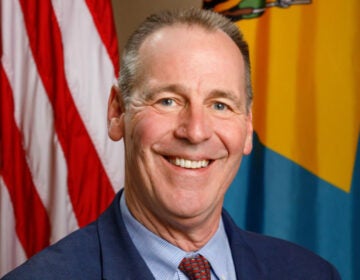Lawsuit accuses Wilmington of scrapping cars over unpaid parking tickets
Two Wilmington residents are suing the city and its towing contractors for scrapping cars worth thousands of dollars over unpaid parking tickets.

Ameera Shaheed is suing the city of Wilmington and its towing contractors, accusing them of selling her car for scrap because she owed $320 in parking fines. (Institute for Justice photo)
Two Wilmington residents are suing the city and its towing contractors for seizing and scrapping cars worth thousands of dollars over unpaid parking tickets.
Ameera Shaheed was ticketed six times for illegally parking her car in a span of nine days. As a result, her car was towed and impounded even as she appealed the tickets as unlawful. The impound lot held her car until she could pay the city $320.
After 30 days of not paying the money, Shaheed says the city’s towing contractor sold her car for scrap and kept the entire value of her car for themselves.
That’s part of a lawsuit filed against the city of Wilmington in federal court Wednesday morning.
“They just want to do things to get money out of people,” Shaheed said in a YouTube video produced by the Institute for Justice, which filed the lawsuit on her behalf. “I was mad. I was infuriated because they weren’t giving me answers”
Shaheed’s attorney Will Aronin says even after scrapping her car and keeping the profit, the city still insisted she owed her ticket fines.
“Can you imagine losing your car for a couple of parking tickets or a couple hundred dollars in parking tickets? What is that, five tickets? And then, them still coming after you? It’s so disproportionate and it’s so offensive,” Aronin said. “The idea that they take the car, don’t credit it towards the parking tickets and don’t return the extra value is staggeringly unconstitutional.”
Aronin works for the Institute for Justice which focuses on making sure the Constitution’s protections of property rights, free speech, economic liberty and educational rights are upheld. IJ is representing Shaheed and fellow Wilmingtonian Earl Dickerson who had a similar situation happen with his car.
The lawsuit claims Dickerson’s van was towed after he was ordered to move it within seven days. Aronin said Dickerson missed the deadline while dealing with the death of a grandchild.
Even after paying the $60 ticket, Dickerson claims the towing company demanded $910 in storage fees before releasing the car back to him. When he didn’t pay, the company sold the vehicle for scrap and kept the proceeds.
“I’m looking to get my car, or the value of my car back so that I can relax and try to rebuild what I’ve lost,” Dickerson said in the IJ video.
The Wilmington lawsuit claims the city’s towing contractor City Towing Services towed 2,551 cars in 2020, keeping 987 of them, more than 38%.
Wilmington’s contract with the towing company doesn’t cost the city anything. Instead of being paid by the city for towing and impounding cars, the towing company collects fees from car owners. The lawsuit says that creates “an obvious incentive problem: the only way for its private contractors to make money was to sell, scrap, keep, or otherwise dispose of the cars that they towed.”
“So, we should not be surprised that that’s what happened. Incentives matter,” Aronin said. “We’re suing to say this entire system is unconstitutional.”
Earlier this year, the Wilmington Parking Coalition raised a series of similar but separate complaints about the city’s overzealous parking enforcement.
In response to those complaints, the city issued a lengthy memo in May. In that statement, the city argued that having the towing company earn money by salvaging or selling cars was “common practice within the towing industry and is governed by the laws of the state of Delaware.”
The city statement says residents will often owe more than a car is worth, “thus they make the decision to abandon their vehicle at City Towing… If an individual has been towed for non-payment of tickets, the value of the tickets would only reach this point if they were a chronic or intentional violator of the law.”
Wilmington officials say the towing contractor provides them with a monthly record of all owners who were successfully contacted after their vehicle was towed, and that “the city is satisfied that City Towing has made every available effort to contact vehicle owners.”
Shaheed and Dickerson are asking the court to order the city to return their vehicles, or the fair market value of their cars if they’ve been scrapped. They also want the court to rule that the towing company’s process for seizing property to satisfy a debt and then keeping the excess proceeds above the debt amount is unconstitutional. They also ask for a permanent injunction to keep the towing companies from doing that to other car owners going forward.
A spokesman for Wilmington Mayor Mike Purzycki said the city has received the lawsuit, and is “reviewing the details, but will not have any comment at this time.”
The Institute for Justice successfully argued a similar case before the U.S. Supreme Court in 2019. In that case, the Supreme Court ruled the Constitution’s ban on excessive fines applies to state and local governments as well as the federal government. In that case, Timbs v. Indiana, Tyson Timbs sued the state for seizing his $42,000 Land Rover for selling a small amount of heroin to undercover cops for $400.
“Forfeiture of the Land Rover, the court determined, would be grossly disproportionate to the gravity of Timbs’s offense,” the late Supreme Court Justice Ruth Bader Ginsburg wrote in her opinion at the time. She added that excessive fines were outlawed by the Bill of Rights to protect individual liberty.
“Protection against excessive fines has been a constant shield throughout Anglo-American history for good reason: Such fines undermine other liberties,” she wrote.

Get daily updates from WHYY News!
WHYY is your source for fact-based, in-depth journalism and information. As a nonprofit organization, we rely on financial support from readers like you. Please give today.






